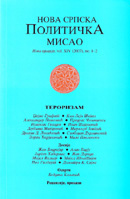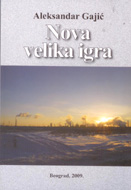| NSPM in English | |||
UN Papers and the Gross Reality |
 |
 |
 |
| среда, 10. јун 2009. | |
|
On the Tenth Anniversary of the UN Security Council Resolution on Kosovo
The Resolution the tenth anniversary of which nobody seems willing to celebrate in the UN headquarters, Belgrade, or Pristina is usually attributed to an intricate compromise. Ten years ago the Russian leadership managed to incorporate into it several fundamental principles concerning the Kosovo settlement. Most importantly, it was stressed in the document's preamble that the Kosovo problem had to be solved on the basis “of the commitment of all Member States to the sovereignty and territorial integrity of the Federal Republic of Yugoslavia and the other States of the region”. Correspondingly, the Resolution called for “substantial autonomy and meaningful self-administration for Kosovo”. Besides, the UN Security Council reached consensus that international discussions of specific parameters of Kosovo’s future status would begin only after the implementation in the province of the democratic standards guaranteeing the political, economic, cultural, and national rights of the province's non-Albanian population. Nothing of the above materialized. From the outset, the West pushed for Kosovo independence, and only the requirements of Resolution 1244 which could be interpreted so as to broaden the rights and authority of Albanian separatists were actually met. As for Russia, its only accomplishments throughout the period since the passing of the resolution till the opening of the negotiations between Belgrade and Pristina on the status of Kosovo in February, 2006 were the snap offensive which led to the seizure of the Slatina airport by Russian peacekeepers and their quiet withdrawal in 2003 under the pretext that “it was impossible to change anything”. The subsequent talks under the auspices of the UN in which Russia took a somewhat bigger role ended with a predictable failure which made it possible for the Albanian separatists to declare the independence of Kosovo unilaterally in February, 2008. The independence was momentarily recognized by the Albanians' Western donors and ideological patrons. The available information makes it possible to claim that both the passing of UN Security Council Resolution 1244 and the diplomatic maneuvers around Kosovo that ensued – those in which the Russian Foreign and Defense Ministries took part in particular – were nothing but a show originally planned by the West. In the process Moscow's role to which the Russian leadership somehow agreed was that of a “good policeman”. Obviously, Resolution 1244 was stillborn. The key problems were not the poor compliance with its requirements and Russia's inability to make its partners view the UN document with proper respect but the fact that the West had made all the decisions on the status of Kosovo already in the late 1998. The subsequent negotiation between Serbs and Albanians in Rambouillet, NATO airstrikes, discussions in the UN Security Council, and the deployment of the UN mission and NATO peacekeepers in the province were just steps in the realization of the already existing plan. The build-up of the NATO presence in Kosovo also commenced in the late 1998. In the US the point of no return was reached when Michael Polt who coordinated the military policy in the Clinton Administration and later became the US Ambassador to Serbia convinced Secretary of State C. Powell to consent to the intervention in the region. Polt argued that by intervening in Kosovo NATO would send a clear message to all Eurasian countries, of course including Russia. Yugoslavian Vice President Momir Bulatovic said: “It already became clear in October, 1998 that the decision on our future had been made. They started talking about the “humanitarian disaster” in Kosovo and the so-called NATO credibility. The latter meant that if NATO was unable to put an end to the “humanitarian disaster”, then it simply had no right to exist. To avoid a military strike we were ready to make concessions to the extent of retaining only the minimal amount of state dignity and territorial integrity. They were interested in Kosovo's natural resources - we offered US and British companies to develop them at the token price of $1. They responded that the offer was attractive but unacceptable. Then NATO wanted a base in Kosovo. We offered them to have it for the same $1 token price. They were surprised but turned down the offer nevertheless. Trying to avoid conflict we eventually suggested that Yugoslavia should join NATO and thus automatically generate a solution to the Kosovo problem. Again the answer was No. Admitting us to NATO could resolve the dispute over Kosovo but could not solve any of the problems due to which NATO decided to attack our small country. NATO decided to move into Kosovo by forceavoiding any cooperation with us. The point is that if NATO does not reckon with us it would also be free of any obligations to other countries. They branded this the New World Order”. The US still had to secure Europe's consent to launching the offensive. Washington proposed “to give Serbs another chance” and to hold an international conference on Kosovo in Rambouillet in February, 1999. Belgrade faced totally unprecedented requirements deliberately formulated to make the aggression against Yugoslavia inevitable. Momir Bulatovic recalled: “In Rambouillet we were asked to agree to the deployment of NATO forces in Kosovo and to allow them access to all of the Yugoslavian territory. According to a document which looked like an ultimatum, all our expressways, railroads, air space, and installations were to be used by NATO free of charge and without any limitations. All NATO servicemen were to be exempt from our laws and or any criminal responsibilities. All the decision-making was to be left to the commander of the NATO contingent. The document was formulated so that no sane individual could ever sign it”. As expected, Yugoslavia' representatives did not agree to the de facto occupation of their country. Russia actively took part in the Rambouillet “negotiations” though the Russian leadership had to be aware that the West had already laid the finishing touches on the scenario for Kosovo. Russia's involvement only helped to make the enforced separation of Kosovo – the cradle of the Serbian national statehood – from Serbia appear more peaceful and take somewhat longer to complete... Viewing the situation now in 2009 one can only hope that Russia has learned the lessons. Russian diplomats admit in private conversations that Moscow should start cooperating more actively with the Balkan political forces which can be regarded as its potential allies in future conflicts over Eurasian political arrangements and energy security. Kosovo has been torn out of Serbia - this is the gross reality, not a passage from some UN papers. Bringing it back would take something other than voting in the UN Security Council, an institution which has become nothing else than a decoration used by the global forces acting behind the curtain. The available information makes it possible to claim that both the passing of UN Security Council Resolution 1244 and the diplomatic maneuvers around Kosovo that ensued – those in which the Russian Foreign and Defense Ministries took part in particular – were nothing but a show originally planned by the West. In the process Moscow's role to which the Russian leadership somehow agreed was that of a “good policeman”. (Strategic Culture Foundation, 09.06.2009, http://en.fondsk.ru/article.php?id=2214) |
Остали чланци у рубрици
- Playing With Fire in Ukraine
- Kosovo as a res extra commercium and the alchemy of colonization
- The Balkans XX years after NATO aggression: the case of the Republic of Srpska – past, present and future
- Из архиве - Remarks Before the Foreign Affairs Committee of the European Parliament
- Dysfunction in the Balkans - Can the Post-Yugoslav Settlement Survive?
- Serbia’s latest would-be savior is a modernizer, a strongman - or both
- Why the Ukraine Crisis Is the West’s Fault
- The Ghosts of World War I Circle over Ukraine
- Nato's action plan in Ukraine is right out of Dr Strangelove
- Why Yanukovych Said No to Europe

.jpg)








 June 10 is a sad date in the history of the UN, the institution originally meant to play the key role in ensuring peace, security, and the primacy of law in the world. The decade since the passing of the June 10, 1999 UN Security Council Resolution 1244 addressing the Kosovo problem – the document totally ignored throughout the period - has shown that the UN is no longer playing the role prescribed to it by the post-World War II system of the international law.
June 10 is a sad date in the history of the UN, the institution originally meant to play the key role in ensuring peace, security, and the primacy of law in the world. The decade since the passing of the June 10, 1999 UN Security Council Resolution 1244 addressing the Kosovo problem – the document totally ignored throughout the period - has shown that the UN is no longer playing the role prescribed to it by the post-World War II system of the international law.












